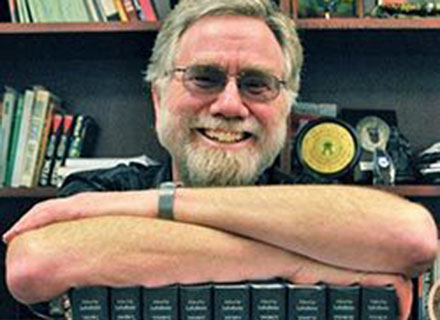Gun control is typically viewed as one of the most polarizing subjects in political discourse today. Now a book by a USF St. Petersburg professor is looking to inject some nuance into the highly-charged debate over firearms and how they should be used.
Dr. Hugh LaFollette explores the moral, conceptual and empirical arguments for and against firearm restrictions in his latest book, “In Defense of Gun Control.” With philosophical rigor, LaFollette delves into the critical questions such as: Who should be permitted to own guns? Which guns should be allowed? And how should we regulate a person’s ability to carry a gun around?
LaFollette, a Professor of Philosophy and Marie and Leslie E. Cole Chair in Ethics at USF St. Petersburg, traces his interest in guns and gun control to a few formative moments from his past. The first came when he was 13 years old and received a shotgun as a gift from his father, who owned a few firearms and often hunted with his buddies in the Tennessee woods.
“The gift just blew me away,” said LaFollette. “It meant that, in my father’s mind, I was a man in his world. I could now join him and his friends on their hunting trips.”
Then, in 1996, LaFollette began a year-long teaching stint at a university near the town of Dunblane, Scotland, where that same year a gunman murdered 16 children and a teacher at the local elementary school. A wave of public outcry and debate immediately followed the massacre and led the country to outlaw private ownership of most handguns.
During his time in Scotland, LaFollette met with parents and neighbors of those killed, and interviewed Peter Watson, a local lawyer who helped lead the charge for tighter gun restrictions.
“I began to sense the pain of what these parents had gone through,” said LaFollette.
Soon after returning to the United States, LaFollette was invited to give a lecture on a topic of his choosing at the University of Western Michigan. Moved by his experience in Dunblane, he decided to speak on gun control.
“I spent three or four months doing as much intensive reading as I could,” said LaFollette. “I studied what philosophers, physicians, criminologists and public health people had written about the topic. The more I immersed myself in the literature, the more I felt a greater need to address the issue, because there were so many bad arguments in the public domain. I decided to clarify the issue by explaining and evaluating the dominant views.”
LaFollette put together a presentation on the topic and later spun that lecture into a paper for the renowned philosophy journal Ethics. That paper formed the foundation of “In Defense of Gun Control.”
In his book, LaFollette unpacks three types of arguments that drive the debate over gun control: armchair arguments, rights-based arguments and empirical arguments. In short, armchair arguments are informed by background information and evidence, rights-based arguments are those governed by individual freedoms and empirical arguments are those based on observation, experience and some controlled experiments.

LaFollette lays out a number of questions and critiques commonly held positions related to firearm regulation. For example, he evaluates whether guns are necessary for self-defense and challenges the validity of data suggesting that more guns make communities safer, while also claiming some arguments for gun control are over-stated.
LaFollette rejects the idea that there are two “sides” to the gun control debate. Rather, he sees it more as a spectrum. That said, with a title like In Defense of Gun Control, it isn’t hard to decipher which side of the spectrum LaFollette stands on.
“I wanted to make it clear up front exactly what the book is about,” he says. “I do support gun control but not complete control on all people and in all circumstances. I support limiting some people from have some guns, as well as restrictions on the guns they do own.”
However, LaFollette began his research without a settled view on either side of the debate. As a philosopher, he followed the path of logical reasoning. The result is an unbiased investigation into gun control and attempt to lay the groundwork for a practical means of regulation.
“The considerations I raise in the book are not radical,” LaFollette says. “They will be familiar to any open-minded and informed reader. I just want to point the reader in the right direction.”
As more and more Americans find their lives impacted by America’s gun laws, LaFollette felt it was important to write a book that was comprehensible to the non-academic reader. He worked with about 20 citizens to help refine and clarify his arguments throughout the process of writing “In Defense of Gun Control.”
LaFollette plans to use this same technique of engaging citizens while working on his next project, a book titled “Grace, Gratitude and Government.”
“I saw this primarily as fulfilling an academic’s responsibility to communicate ideas to the public,” LaFollette says. “But I also understood I would be a huge beneficiary of the process. People made very good points, asked very good questions and pressed me in ways I needed to be pressed. They helped me be clearer about some ideas, develop arguments better, be fair to opposing sides and defend my views as well as possible.”
